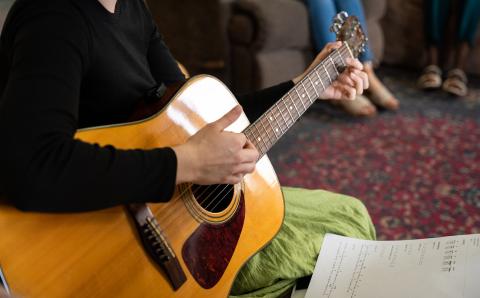“Dad, why do you have to go to Life Group again? Didn’t you go last week? Can’t you stay home for one week? Why do you have to go every Monday?” I was greeted with this barrage of questions from my son at the dinner table the other day when I explained to him why I was heading out the door after dinner.
Not having time to get into a discussion with my 8-year-old, I gave him the tried-and-true answer of “I have to go because it’s important,” hoping that would satisfy his quest for an answer. It didn’t. “Well, it’s not important for me,” was his quick response.
“We can talk more about this later,” I replied while tying my shoes and heading out the door.
I replayed this conversation in my head a few times as I drove to my Life Group meeting. I soon began to realize that perhaps the reason my son didn’t understand why gathering with fellow believers is important is because I didn’t truly understand it either.
Many of our churches will have some form of communal study group. While they go by a myriad of names, the purpose and operation of these groups is about the same. We gather at someone’s house, share in a fine assortment of baked goods, and sip on some coffee as we discuss the topic or theme that was assigned to the group.
I arrived at my Life Group early and had a few minutes to continue pondering what made small groups so important, and I soon began to realize something: They are not important.
You see, it’s not the fancy name, special snacks, comfy seats, and perfectly brewed coffee that make small groups important. While these things are nice bonuses, it is what happens in these groups that makes them important. These groups offer a unique opportunity to explore and apply the deeper themes of Scripture in a community setting. Unlike the corporate worship of a Sunday morning service, these groups allow for questions, connections, and learning on an interpersonal level.
I’ve heard it explained before that community and discipleship don’t happen in rows; they can only happen in circles. Compare the seating arrangement of your sanctuary to that of your last small-group meeting and you will begin to see this in action. The idea is that gathering as a large body of believers is essential, but we also need time in a smaller group with like-minded Christians to wrestle with and explore the deeper truths of the gospel and how they apply to and change our life. We can turn to the early church of Acts 2 as an example of what happens when the church spends more time in circles than rows.
In the past, I’ve often found myself weighing participating in a small group against the other commitments I have made, trying to keep the number of weeknight engagements manageable. Yet by making myself choose between a small group and other activities, I was missing the point. Despite the efforts of the church leadership, I did not fully grasp the importance of small groups, yet my participation has been a transformative experience for me. Exploring Scripture with others, sharing insights, and connecting with fellow members has deepened my faith and provided a supportive environment for personal reflection and spiritual growth.
So don’t get hung up on the name that your church has for these groups, as the name is not the important part. These groups are the place where real ministry of the church takes place as we study God’s Word while supporting each other and sharing our lives with one another.
Discussion Questions
- Have you been involved in a small discipleship or Bible study group before? What was your experience(s) like?
- Do you agree with the statement: “Community and discipleship don’t happen in rows; they can only happen in circles”? Why or why not?
- Are there biblical examples for a small group experience?
- Are there any possible pitfalls for a small study group? How do we avoid them?
About the Author
Dan Veeneman works in the dairy industry as a ventilation specialist. He lives in Abbotsford, B.C., with his wife and three children. He is a member of Gateway Community Church.









